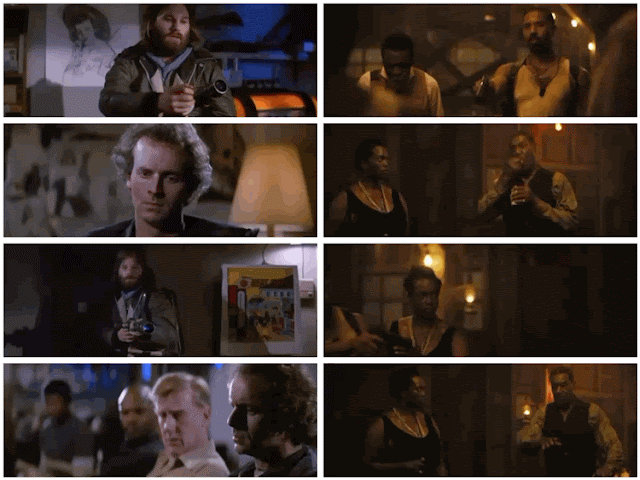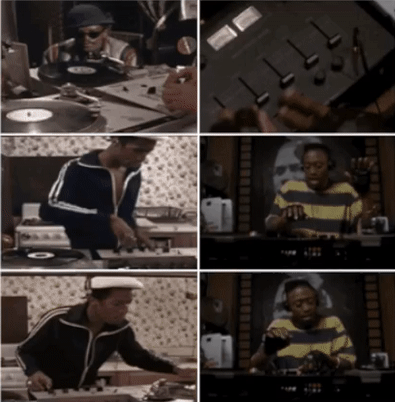I included this film in my recent piece over at Okayplayer.com about the modern Black Film Canon (
click here to read), but I felt like going a bit more in depth over on my own personal blog. If you're exhausted with all the insufferable takes on Ryan Coogler's
Sinners and are looking for an alternative perspective on Black American life - look now further than
Personal Problems. But please approach with caution as this is a Black film that can't be dissected through the lens of
Get Out (is it me, or does it feel like most popular modern Black films can't be analyzed unless it's through the lens of something
Get Out-related?). Contrary to what the average film twitter or letterboxd "critic" will have you believe - there are plenty of Black films with stories that exist outside of the white boogeyman or "stay away from dem white women"...
In the era of the Black-led/“Black Is Beautiful” films like
Beale Street, Moonlight, Dope,
Nickle Boys, the discovery/re-discovery of works like Bill Gunn’s
Personal Problems is a breath of fresh air. Not to take anything away from the films of Barry Jenkins & Ava Duvernay (their films do serve a purpose and have a somewhat authentic audience) but there is a little more substance to the work of Gunn. While a lot of today’s popular “Black films” don’t go beyond the surface of saying; “Black Skin & Black people are Beautiful” (which, as a proud Black person, is obviously something I subscribe to), a movie like
Personal Problems delves in the complexities of “Blackness”, loyalty, infidelity, the power dynamic in the Black household and so much more (the same could be said about other older recently rediscovered Black films like
To Sleep With Anger, Ganja & Hess, Ashes & Embers, etc). The more I watched Bill Gunn’s epic 2nd feature, the more I saw my parents, uncles, aunts and various 2nd cousins who used to drop on & off the grid from time to time. It’s almost like you could feel the cigarette smoke emanating off of the actors. I’m a child of the 80’s & 90’s so I remember when parents used to smoke cigarettes (...and weed) directly in to a child’s personal space. One Of my oldest memories of growing up during the 80’s in a Black household is that thick cigarette smoke, Alongside Hennessy bottles, soul music & loud laughter.
Personal Problems is all of those things and more (I also relate to
Personal Problems on a deeper level as my Mother & Father are from South Carolina & New York City, respectively, like our protagonist couple in the movie).
While there is a plot (the two act film centers around a Black family living in Harlem as they struggle with money, work, infidelity & death),
Personal Problems is really about the banalities and authentic qualities that you cant find in most films about Lower-middle class Black America. For those of you that don’t know,
Personal Problems was shot on what appears to be a camcorder which just adds to the authenticity. At times you almost feel like you're watching a mix between a documentary and a heavily improvised Shadows-era John Cassavetes film full of energy and wonderful mistakes.
Personal Problems is a transgressive work of cinematic art that intentionally alienates some of its audience. It’s almost three hours long and the fact that it was shot on a cheaper camera brings on a whole additional chain of issues (the audio is far from perfect and it should go without saying that the visuals are quite grainy). But, in my opinion, more Black films need to be transgressive & complex as opposed to catering to the opinionated (yet often uninformed) social media audiences that just want to be spoon-fed nice & happy things (especially when it comes to movies about Black folks). I mean how often does the issue of someone’s body Oder come up in a movie in a non-comical way? We get things like that in
Personal Problems because Bull Gunn delves in to the nasty crevices that a lot of filmmakers avoid.
The theatrical release of
Personal Problems couldn’t have come at a better time with the universal praise of Barry Jenkin’s
If Beale Street Could Talk. These two films would make an interesting double feature. Again - not to take anything away from Jenkins and his success, but at times Beale Street felt a little “Safe”. The issues in Beale Street (which come from James Baldwin’s writing) are quite real and not to be taken lightly, but the stylized slow-motion sequences and non-stop close-up shots of (beautiful) Black faces started to take precedent of the actual meat of the story. I don’t necessarily need a film (or anything/anyone) to remind me that Black is beautiful. I know this. But perhaps some folks don’t know this and need to be reminded of this from time to time (we still live in a world where Black lives don’t always matter). And that’s fine. That’s the audience for Beale Street. I like to think I represent the audience
Personal Problems. There is a place in this world for both movies to exist. I just think there needs to be more complex & “difficult” films to balance out all the “safer”, “less threatening” films that focus on Black life in America.
Honestly – I’m just glad we have a new (Black) director’s body of work to include in the unofficial Black film canon that’s been curated mostly by white cinephiles and Black cinephiles who don’t delve deeper than
Daughters Of The Dust and/or
Killer Of Sheep. No disrespect to Julie Dash (
Daughters Of The Dust) or Charles Burnett (
Killer Of Sheep) but there’s a whole world of modern Black cinema out there waiting to be re-discovered and placed on a pedestal.







.gif)

.gif)














.gif)












